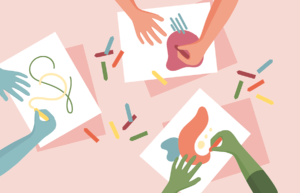What is expressive therapy? This is a question that many people have, but don’t know how to answer. Expressive therapy is a form of therapy that uses creative outlets to help people express their feelings and emotions. This type of therapy can be very beneficial for people who are struggling with mental health issues, or who are just looking for a way to express themselves. In this blog post, we will discuss the benefits of expressive therapy and how it can help you!
Contents
What Is Expressive Therapy?

Expressive therapy is a form of psychotherapy that uses the arts to help people express their emotions and improve their mental health.
Expressive therapy can be used to treat a wide range of mental health conditions, such as anxiety, depression, PTSD, and eating disorders. It can also be used to help people cope with life transitions, such as divorce or retirement. Expressive therapy is believed to work by helping people access and express their emotions safely and creatively. This can lead to improved mental health and well-being.
This therapy is also sometimes called creative arts therapy or art therapy. It can involve activities such as painting, drawing, sculpting, music, and dance. Expressive therapists are trained in both the arts and psychotherapy, and they use their skills to help people heal emotionally and mentally.
If you are struggling with mental health issues, expressive therapy may be a good option for you. This type of therapy can help you express your emotions safely and creatively, which can lead to improved mental health and well-being. Talk to your doctor or a mental health professional about whether expressive therapy could help you.
Different Types of Expressive Therapies

Expressive therapies are not one-size-fits-all. Different people will respond to different types of expressive therapies, depending on their needs and preferences. Some common types of expressive therapies include:
Art Therapy
One of the most common types of expressive therapy is art therapy. Art therapy can involve activities such as painting, drawing, and sculpting. It is believed to work by helping people access and express their emotions safely and creatively.
In art therapy, you do not need to be an artist to benefit from the therapy. The focus is on the process of creating art, not on the final product. Art therapy can be used to treat a wide range of mental health conditions, such as anxiety, depression, PTSD, and eating disorders.
Music Therapy
Music therapy is a form of expressive therapy that uses music to improve the quality of life for people with various conditions. Also, Music therapy is effective in treating a wide range of issues, including anxiety, depression, pain, and stress.
If you’re struggling with any of these issues, or if you just want to improve your overall well-being, consider giving music therapy a try. You may be surprised at how much it can help you.
Through music therapy, you can:
-Express your emotions in a safe and healthy way
-Reduce stress and anxiety
-Improve your mood
-Boost your self-esteem and confidence
-Increase your sense of well-being
Movement Therapy
An expressive therapy that uses movement and body-based techniques to improve mental and physical well-being is called Movement Therapy. This type of expressive therapy can help to improve coordination, flexibility, strength, and stamina. It can also reduce stress, anxiety, and depression.
This is also called dance/movement therapy or somatic movement therapy. This type of expressive therapy uses music, dance, and other forms of body movement to improve mental and physical well-being.
Movement Therapy can help to improve coordination, flexibility, strength, and stamina. It can also reduce stress, anxiety, and depression. This type of expressive therapy can be used to treat a wide variety of conditions such as Alzheimer’s disease, autism spectrum disorder, cerebral palsy, multiple sclerosis (MS), Parkinson’s disease, and stroke recovery.
Drama Therapy
Drama therapy is an expressive therapy that uses acting and role-playing to help people express their emotions. Also, Drama therapists typically work with clients to develop scenes that represent different emotions, teach skills for using drama to cope with difficult emotions, and help clients develop a better understanding of their own emotions.
Working on Expressive Therapy

Expressive therapy is a type of psychotherapy that uses different forms of communication to help people explore their emotions and improve their mental health. This type of therapy can be beneficial for people who have trouble expressing themselves verbally.
Expressive therapies can include art therapy, music therapy, drama therapy, and dance/movement therapy. Each type of expressive therapy uses a different form of communication to help people express themselves.
Art therapy uses different art forms to help people express themselves creatively. This can include painting, drawing, sculpture, and other visual arts. Music therapy uses music to help people express themselves emotionally. This can include listening to music, playing music, or writing songs. Drama therapy uses acting and role-playing to help people explore their emotions. Dance/movement therapy uses movement and dance to help people express themselves physically.
Expressive therapies can be used to help people with a variety of mental health issues, including anxiety, depression, trauma, and stress. These therapies can help people to cope with their emotions and improve their mental health.
Benefits of Expressive Therapy
Expressive therapy is a type of therapy that uses the arts to help people express themselves and explore their emotions. It can be used to treat a wide range of mental health issues, such as anxiety, depression, trauma, and substance abuse.
The benefits of expressive therapy are numerous. This type of therapy can help people to:
Express themselves in a safe and creative outlet
One of the most beneficial aspects of expressive therapy is that it provides a safe outlet for people to express themselves. This is especially helpful for those who have experienced trauma or who have difficulty expressing their emotions in words. The arts offer a non-verbal way to express oneself, which can be very healing.
Explore emotions in a safe and creative environment
Another benefit of expressive therapy is that it provides a safe environment for people to explore their emotions. The therapist can help guide the individual in exploring difficult emotions in a way that is comfortable and safe for them. This can be very helpful for those who have trouble dealing with their emotions or who need help processing them.
Build self-esteem and confidence
Expressive therapy can also help to build self-esteem and confidence. This type of therapy can help people to see themselves in a more positive light and to feel good about their accomplishments. This can be very helpful for those who have low self-esteem or who need help boosting their confidence.
Improve communication skills
Expressive therapy can also help to improve communication skills. This type of therapy can help people to express themselves more clearly and to better understand the emotions of others. This can be very helpful for those who have difficulty communicating their needs or who have trouble understanding the feelings of others.
lessens symptoms of mental health issues
Expressive therapy can also help to lessen the symptoms of mental health issues. This type of therapy can help to reduce anxiety, depression, and stress. It can also help to improve sleep and concentration.
Explore their emotions in a non-verbal way
Sometimes it can be difficult to express emotions in words, especially if they are negative emotions. The arts offer a non-verbal way to express emotions, which can be very helpful for those who have difficulty expressing their emotions verbally.
Find new ways to cope with stress and anxiety
Expressive therapy can also help people to find new ways to cope with stress and anxiety. This type of therapy can help people to learn relaxation techniques and to develop healthy coping mechanisms. This can be very helpful for those who have difficulty dealing with stress or who need help finding healthy ways to cope with anxiety.
Risks Associated With Expressive Therapy

Expressive therapy is generally considered a safe and effective form of treatment. However, as with any type of therapy, there are some potential risks and side effects associated with this type of treatment. These risks and side effects may include:
Discomfort or feeling uneasy during the therapy session
One of the most common risks associated with expressive therapy is discomfort. This can happen for several reasons, such as feeling emotionally vulnerable during the session or feeling uncomfortable discussing certain topics. It is important to remember that the therapist is there to help you and will not force you to discuss anything that you are not comfortable with. If you feel uncomfortable at any point during the session, you should feel free to tell the therapist.
Opening up old wounds
Another potential risk associated with expressive therapy is re-experiencing old emotional wounds. This can happen if you are discussing a traumatic event from your past or if you are working through other difficult emotions. While this may be painful in the short term, it can ultimately help you heal these wounds and move on from them. If you do start to feel overwhelmed or triggered by the emotions that come up during therapy, be sure to let your therapist know so that they can help you manage them.
Dependency on the therapist
Another potential risk of expressive therapy is becoming too dependent on the therapist. This can happen if you start to rely on the therapist for emotional support or if you become too reliant on the structure of the sessions. If this happens, it is important to discuss it with your therapist so that they can help you find other ways to cope with your emotions outside of therapy.
feeling emotionally overwhelmed or feeling worse after the therapy session
Also, while expressive therapy can be helpful for many people, there is a chance that it could make you feel worse. This is most likely to happen if you are not ready to deal with the emotions that come up during therapy or if you are not able to process them healthily. If you start to feel worse after a therapy session, be sure to talk to your therapist about it so that they can help you manage your emotions more productively.
Conclusion
Expressive Therapy can help people in several ways. It can be used to help people express themselves, work through difficult emotions, and explore creative outlets. If you are struggling with something in your life, consider talking to a therapist about whether Expressive Therapy could be right for you.
If you would like to learn more about Expressive Therapy, please visit our website or contact us today. Furthermore, We would be happy to answer any questions you have or provide you with additional resources.
Hope this article was of help to you! If you are suffering from mental health disorders, you may seek help from Therapy Mantra. We have a team of highly trained and experienced therapists who can provide you with the tools and skills necessary for overcoming mental health disorders. Contact us today to schedule an online therapy or download our free Android or iOS app for more information.


